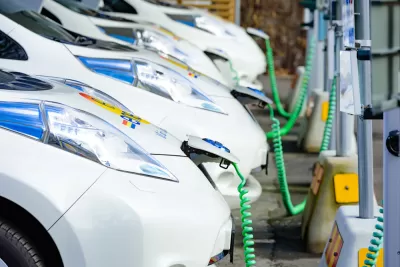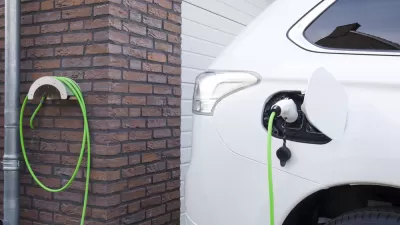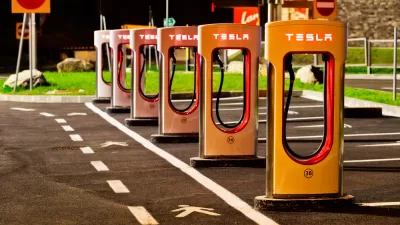With comprehensive legislation to enable California to continue its powerful agenda of tackling climate change in peril, a Southern California assemblywoman will introduce legislation to tackle the specific issue of sales of electric vehicles.

California may lead the nation in purchasing electric vehicles, but there are still too many passenger vehicles burning gasoline and diesel for the state to meet its ambitious climate goals. Due to recent political developments, increasing sales of EVs may be the best strategy to reduce the state's carbon emissions. Transportation accounted for 37 percent of the greenhouse gas emission inventory in 2014.
"With the blessing of Governor Jerry Brown, a California legislator plans to increase pressure on carmakers to produce zero emissions vehicles," reports Bruce Brown for Digital Trends. "Assemblywoman Autumn Burke, D-Los Angeles, said [Friday] she’s going to present legislation next week to require that 15 percent of all new cars be emission-free within 10 years, according to the Associated Press."
Burke's proposal comes as SB 32, the bill that will pick up where AB 32, the Global Warming Solutions Act of 2006, ends at 2020, appears to be faltering under the pressure of the oil lobby.
Current Zero Emission Vehicle (ZEV) requirements [A description of both mandates was posted here last year]
- A California Air Resources Board regulation requires that 1.4 million zero emission vehicles be on California roads by 2025. [See ZEV program].
- Governor Jerry Brown signed an executive order in 2012 "laying the foundation for 1.5 million ZEVs on California’s roadways by 2025."
ZEVs are battery electric vehicles and fuel cell electric vehicles.
"So far, 192,000 ZEVs have sold in the state since 2010, according to the California Air Resources Board (CARB)," writes Brown. "But that’s not fast enough in the governor’s view."
Kish Rajan, a former Brown appointee and a spokesman for technology industry group CALinnovates said “The current credit program just does not appear to be working. At least it’s not working fast enough to get toward the goals that the governor has laid out and that CARB is seeking to enforce.”
Burke's proposal "would require 15 percent (300,000) of new cars sold in the state be emissions-free by 2025," states a San Francisco Chronicle editorial. "This is a big reach, because just 3 percent of new-car sales are electric and plug-in hybrids today, according to the state Air Resources Board."
Plug-in hybrid electric vehicles, like the Chevrolet Volt, are not zero emissions as they also can burn gasoline. Under Burke's proposal, they would not qualify for meeting the 15 percent mandate, nor would they receive credits.
New rules are needed, Burke told the Associated Press on Friday, because the current program is bringing zero-tailpipe-emissions vehicles onto California highways much too slowly. Automakers are getting around state-mandated quotas of zero-emissions vehicles by purchasing credits, not selling cars.
The editorial indicates that the auto industry is opposed to the new legislation, suggesting that rather than increasing mandates, the state should be increasing ZEV incentives. Global Automakers, which represent international automobile manufacturers, wants "the state to restore subsidies for electric vehicle purchases and revive the carpool-lane-access sticker program." The Chronicle's response:
Subsidies and stickers aren’t the best incentives to sell electric cars; attractive cars are. Hopefully, a challenging goal will encourage carmakers to design them.
Note: the state's rebate and carpool lane access programs are ongoing.
The politics of climate change legislation in California looks like Big Oil is winning. If SB 32 fails a second time, it will be the oil industry's second major victory after they removed the oil-reduction mandate from SB-350, the Clean Energy and Pollution Reduction Act of 2015. Perhaps environmental advocates will fare better with the auto lobby.
Hat tip to MTC-ABAG Library, News Headlines.
FULL STORY: California contemplates adding more teeth state's electric vehicle mandate

Study: Maui’s Plan to Convert Vacation Rentals to Long-Term Housing Could Cause Nearly $1 Billion Economic Loss
The plan would reduce visitor accommodation by 25,% resulting in 1,900 jobs lost.

Alabama: Trump Terminates Settlements for Black Communities Harmed By Raw Sewage
Trump deemed the landmark civil rights agreement “illegal DEI and environmental justice policy.”

North Texas Transit Leaders Tout Benefits of TOD for Growing Region
At a summit focused on transit-oriented development, policymakers discussed how North Texas’ expanded light rail system can serve as a tool for economic growth.

San Diego County Sees a Rise in Urban Coyotes
San Diego County experiences a rise in urban coyotes, as sightings become prevalent throughout its urban neighbourhoods and surrounding areas.

Los Angeles County Invests in Wildfire Recovery for Parks, Trails, and Open Space
The $4.25 million RESTORE Program supports the recovery of parks, trails, and open spaces damaged by the January 2025 wildfires through targeted grants that promote community healing, wildfire resilience, and equitable access to nature.

Nevada Bills Aim to Establish Home Insurance Assurance Amidst Wildfire Risk
Republican sponsor hopes the FAIR plan would be “a true market of last resort.”
Urban Design for Planners 1: Software Tools
This six-course series explores essential urban design concepts using open source software and equips planners with the tools they need to participate fully in the urban design process.
Planning for Universal Design
Learn the tools for implementing Universal Design in planning regulations.
Smith Gee Studio
Alamo Area Metropolitan Planning Organization
City of Santa Clarita
Institute for Housing and Urban Development Studies (IHS)
City of Grandview
Harvard GSD Executive Education
Toledo-Lucas County Plan Commissions
Salt Lake City
NYU Wagner Graduate School of Public Service




























